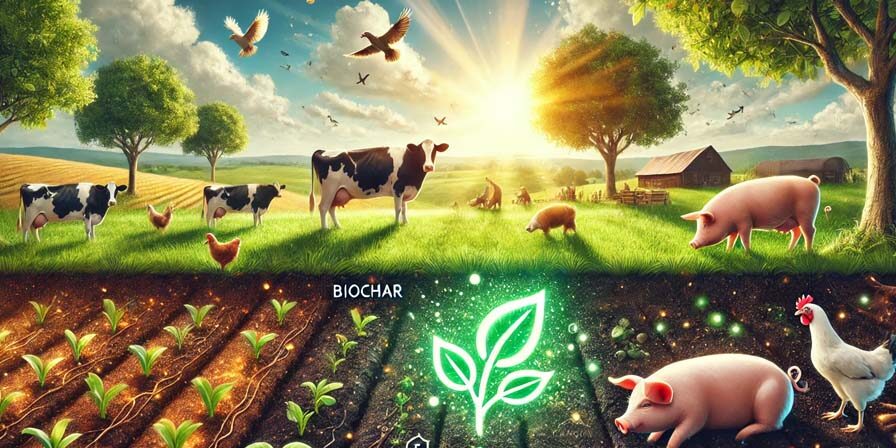Certain animals have shown more pronounced benefits from the inclusion of biochar in their feed. Here are some specific examples:
-
Cattle
- Digestive Health: Biochar can improve the digestive health of cattle by promoting a balanced gut microbiome. This leads to better nutrient absorption and overall health[1].
- Methane Reduction: Studies have shown that biochar can reduce methane emissions from cattle by up to 10.7%, making it a valuable tool for reducing the environmental impact of livestock farming[1].
- Poultry
- Ammonia Reduction: In poultry farming, biochar has been used to reduce ammonia emissions from litter, leading to a healthier environment for the birds[2].
- Improved Growth Rates: Biochar can enhance nutrient absorption and detoxify the digestive tract, contributing to better growth rates and overall health in poultry[2].
- Sheep
- Enhanced Nutrient Utilization: Similar to cattle, sheep benefit from improved nutrient absorption and reduced methane emissions when biochar is included in their diet[1].
- Healthier Fleece: Anecdotal evidence suggests that biochar can improve the quality of sheep fleece, likely due to better overall health and nutrition[1].
- Swine
- Detoxification: Biochar can adsorb toxins and pathogens in the digestive tract of swine, leading to healthier animals and potentially reducing the need for antibiotics[3].
- Growth Performance: Improved nutrient utilization and gut health can lead to better growth performance in swine[3].
Research and Observations
- Cattle Farming: Research conducted on cattle has shown that biochar can improve diet digestibility and reduce methane production, leading to better growth rates and overall health[1].
- Poultry Farming: Studies in poultry farming have demonstrated that biochar can reduce ammonia emissions and improve litter quality, resulting in healthier birds and improved growth rates[2].
Conclusion
Biochar can be particularly beneficial for cattle, poultry, sheep, and swine, offering improvements in digestive health, nutrient absorption, and overall well-being. These benefits, combined with the environmental advantages of reduced methane and ammonia emissions, make biochar a promising feed additive for various types of livestock.
[1]:Biochar Benefits Livestock and Farmers
[2]: The use of biochar in cattle farming
[3]: Biochar as a Feed Additive for Improving the Performance of Farm Animals
References
[1] Biochar Benefits Livestock and Farmers – cleanmainecarbon.com
[2] Biochar: Properties and Potential – Penn State Extension
[3] Biochar Basics: An A-to-Z Guide to Biochar Production, Use, and Benefits







